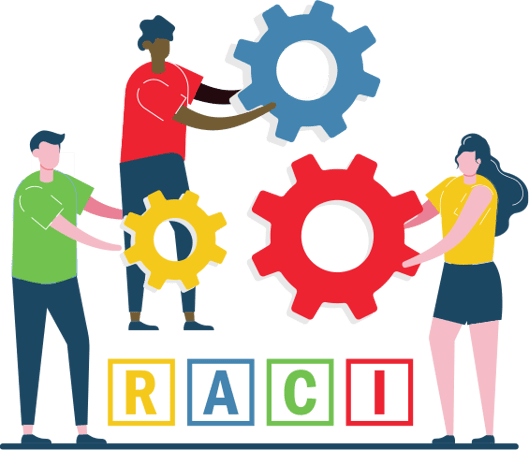By Cassie Solomon, RACI Solutions
Why is empowerment so difficult to achieve? Many of our clients ask us to help them speed up their decision-making culture and diagnose the state of their empowerment ambitions. 
The Oxford Language Dictionary defines empowerment in two ways, both helpful.
- Authority or power given to someone to do something, and
- The process of becoming stronger and more confident, especially in controlling one’s life and claiming one’s rights
We believe that the RACI language gives us a concrete definition of empowerment, in line with the first definition above – empowerment means moving the decision-making “A’s” to people lower in the organization, to “the edge”. Which decisions do senior executives retain, and how do they move some of the decisions to functional managers or project teams? Talking about empowerment without focusing on where decisions are made is too vague and unsatisfying. Employees hear the rhetoric of empowerment without seeing it in action and become cynical. We don’t think “change fatigue” is the product of too much change – instead it results when these initiatives are launched and nothing really changes.
At RACI Solutions, we created the “SRN” Model of Empowerment, pictured below.
There are three elements in the model: Skill, Relationship, and Novelty. You need to consider all three to determine where you are on the empowerment journey, either with an individual or with a team.

Managers Holding On
If you Google, “Why do empowerment efforts fail?” most of the answers lay the failure at the feet of the managers, citing “lack of confidence in others” to “ignorance or inability to empower others.” We disagree.
The right way to empower a Novice is completely different from the right way to empower an Expert although the literature treats this as “one size fits all”. And it’s so normative! If you empower your people, you are considered a great leader. If you don’t, you’re the problem, you are probably holding on. Or you are micro-managing. Our belief is that empowerment isn’t binary, it is a dynamic, an equation with two sides.
In this blog, we’ll focus on the Skill dimension: how much skill does the employee have or do members of the team have. (Please note that skill is different than talent, which is innate aptitude.) For example, riding a bicycle is a skill, which can only be developed with the experience of riding a bike. Skills can be learned, and once you learn a skill, it sticks.
To explore the skill barrier to achieving true empowerment, it helps to go back to the work of Berkeley academic Hubert Dreyfus and his book, “Mind Over Machine: The Power of Human Expertise in the Era of the Computer”, written with his brother Stuart Dreyfus.
The model is below:

Novices work without reference to context – they need rules and plans and checklists. As people acquire more experience, they begin to develop situational awareness and take a more holistic view. By the time people reach the Expert level, they no longer rely on rules, guidelines or maxims. Instead, experts rely on their intuition, where novices make rational decisions based on simple rules.
(An aside - Dreyfus was a fierce critic of early work in artificial intelligence which was almost entirely rules-based; with the development of machine learning, computer models are gaining experience just the way humans do and will end up with the ability to make human-like judgments based on context. Dreyfus’ work – and the way it defines what makes human decision making uniquely human - is still referenced in university AI programs.)
The implication is that in the SKILL element, you need to empower people with different strategies. Novices need experience – and while they are developing their proficiency, they need rules, steps, and checklists. Experts do not.
In the next blog, we’ll dive more deeply into the model and examine RELATIONSHIP and NOVELTY.
Empowerment without accountability is an illusion that leads to disappointment - click here for the blog, “RACI Roles and Responsibilities: Think Accountability".
Meanwhile, Galen Low from the Digital Project Manager and I dive more deeply into RACI and empowerment in this short podcast, “How to Talk with Leadership Teams about Ownership and Accountability.” (part 2 of 2).



